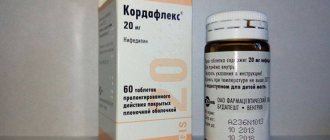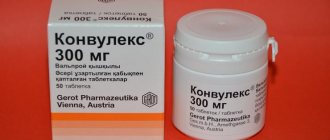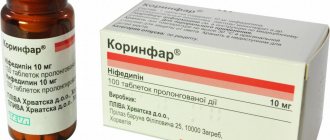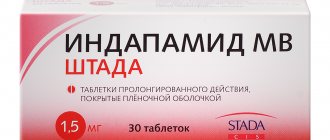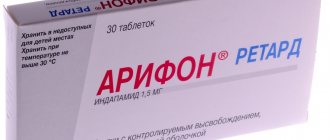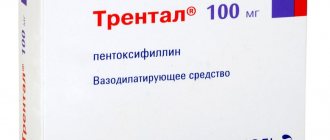pharmachologic effect
A vasodilating drug that improves microcirculation. Trental® 400 improves the rheological properties of blood by affecting the pathologically altered deformability of red blood cells, inhibiting platelet aggregation and reducing high blood viscosity. Trental® 400 improves microcirculation in areas of poor circulation.
The active substance of the drug, pentoxifylline, is a xanthine derivative. The mechanism of action of pentoxifylline is associated with inhibition of phosphodiesterase and the accumulation of cAMP in vascular smooth muscle cells and in blood cells.
It has a weak myotropic vasodilator effect, slightly reduces peripheral vascular resistance and slightly dilates the coronary vessels.
The use of Trental 400 leads to an improvement in symptoms in cerebrovascular accidents.
With occlusive lesions of the peripheral arteries (for example, with intermittent claudication), the effect of the drug is manifested in lengthening the walking distance, eliminating night cramps in the calf muscles and eliminating pain at rest.
Contraindications
The drug is not used for porphyria, acute myocardial infarction, intolerance to xanthine derivatives, breastfeeding, massive bleeding , hemorrhages in the retina, or hemorrhagic stroke. Intravenous infusions are unacceptable in case of uncontrolled arterial hypotension, severe atherosclerosis of the cerebral and coronary arteries, and arrhythmias. In case of peptic ulcer of the digestive system, with CHF, lability of blood pressure, with insufficiency of the renal and hepatic systems, after surgical interventions, pentoxifylline is prescribed with caution. Trental is not used during pregnancy.
Pharmacokinetics
Suction
After oral administration, pentoxifylline is almost completely absorbed from the gastrointestinal tract.
Bioavailability averages 19±13%.
Metabolism
The main pharmacologically active metabolite 1-(5-hydroxyhexyl)-3,7-dimethylxanthine is determined in plasma at a concentration that is 2 times higher than the concentration of the unchanged substance (pentoxifylline).
Pentoxifylline is completely biotransformed in the body.
Removal
T1/2 of pentoxifylline is 1.6 hours.
More than 90% is excreted by the kidneys in the form of unconjugated water-soluble metabolites.
Pharmacokinetics in special clinical situations
In patients with severely impaired renal function, the excretion of metabolites is slowed down.
In patients with impaired liver function, an increase in T1/2 of pentoxifylline and an increase in its bioavailability were noted.
Trental price, where to buy
The price of Trental in 100 mg tablets is 430 rubles for 60 pieces. Cost in Ukraine - 185 UAH.
The price of Trental 400 is 535 rubles for 20 pieces.
The price of Trental in ampoules of 5 ml is 170 rubles for 5 pieces. You can buy it in Ukraine for an average of 200 UAH.
- Online pharmacies in RussiaRussia
- Online pharmacies in UkraineUkraine
- Online pharmacies in KazakhstanKazakhstan
Pharmacy Dialogue
- Trental (tab.prolonged.p.pl/vol.400mg No. 60)Aventis Pharma
RUB 1,467 order - Trental (tab.p/v.400mg No. 20)Aventis Pharma
RUR 616 order
- Trental (tab.prolonged.p.pl/vol.400mg No. 60)Sanofi Aventis
RUB 1,560 order
- Trental (tab.p/v.400mg No. 20)Sanofi Aventis
RUR 611 order
show more
Pharmacy24
- Trental 5 ml N5 solution for injection Quinoin Pharmaceutical and Chemical Products Plant Private Co. Ltd., Ugorshchina
209 UAH order - Trental 400 mg No. 20 tablets Sanofi India Limited, India
215 UAH order
PaniPharmacy
- Trental tablets Trental tablets 400 mg No. 20 India, Sanofi India
219 UAH. order
- Trental ampoule Trental injection solution 100 mg ampoules 5 ml No. 5 Hungary, Chinoin
220 UAH order
show more
Indications for use of the drug TRENTAL® 400
- peripheral circulatory disorders of atherosclerotic origin (for example, intermittent claudication), diabetic angiopathy, trophic disorders (for example, leg ulcers, gangrene);
- cerebrovascular accidents (consequences of cerebral atherosclerosis, such as impaired concentration, dizziness, memory impairment), ischemic and post-stroke conditions;
- circulatory disorders in the retina and choroid of the eye;
- otosclerosis, degenerative changes against the background of pathology of the vessels of the inner ear and hearing loss.
Patient reviews
I’ve heard about the drug Trental 400 for a long time, but only now I started taking it. The medicine, although not very expensive, is of high quality. I didn't experience any side effects while using it. I express my gratitude to the manufacturers of the medicine and the doctor who prescribed it to me.
Alexandra Rogozina
After I suffered a stroke, I was recommended Trental 400 tablets. The doctor promised that when I bought the medicine, he would create a regimen for me to use it. The doctor kept his word and prescribed me a course of treatment. Now I take the pills regularly and feel much better.
Konstantin Vysotsky
Doctors recently discovered that I have peripheral circulatory disorders. To combat the disease, they advised using Trental tablets (400 mg). The price of the drug is low, so I agreed to complete the full course of treatment. I was completely satisfied with its results.
Elena Miroshnichenko
Dosage regimen
Installed individually.
The average dose of the drug for oral administration is 400 mg (1 tablet) 2-3 days. The maximum daily dose is 1200 mg (3 tablets).
The tablets are taken whole, without chewing, during or immediately after meals, with a sufficient amount of water.
In patients with severe renal impairment (creatinine clearance less than 30 ml/min)
the dose can be reduced to 400-800 mg/day.
In patients with liver failure
the dose of the drug is reduced taking into account individual tolerance.
In patients with arterial hypotension, as well as in those at risk due to a possible decrease in blood pressure (patients with severe coronary artery disease or with hemodynamically significant stenoses of cerebral vessels), treatment can be started in small doses. In these cases, the dose should be increased gradually.
Instructions for use of Trental (Method and dosage)
The drug is taken orally, and also administered intraarterially, intravenously, intramuscularly. The dose must be prescribed by a doctor.
For pathology of the renal system, the drug is prescribed at a dose of 50-70% of the standard dose.
Trental ampoules, instructions for use
Typically, 2 intravenous infusions are given in the morning and afternoon, 200-300 mg of the active substance together with a sodium chloride solution. Intravenous infusions are carried out slowly, 50 mg is administered over 10 minutes (together with 10 ml of sodium chloride), after which they switch to administering 100 mg on a dropper (together with 250 ml of sodium chloride, administered for at least an hour). The maximum dose per day can be 0.6 mg of active substance per 1 kg of person’s weight per hour.
Intramuscular injections are carried out deeply 2-3 times a day, 100-200 mg.
Parallel administration of oral forms of the drug is possible at a dose of 800-1200 mg per day for 2-3 doses. The initial dosage is 600 mg per day. If the dynamics are positive, the amount of pentoxifylline is reduced to 300 mg per day.
Trental tablets, instructions for use
Take 100 mg tablets orally with water, during or after meals, 3 times a day, gradually increasing the dose to 200 mg.
Instructions for use Trental 400
Typically take 1 tablet 3 times a day. The maximum dose you can take is 1200 mg of the active substance per 24 hours.
Side effect
From the side of the central nervous system:
headache, dizziness, anxiety, sleep disturbances, convulsions; very rarely - aseptic meningitis.
Dermatological reactions:
hyperemia of the facial skin, rushes of blood to the skin of the face and upper chest, swelling, increased brittleness of nails.
From the digestive system:
xerostomia, anorexia, intestinal atony, feeling of pressure and fullness in the stomach, nausea, vomiting, diarrhea; very rarely - intrahepatic cholestasis, increased activity of liver transaminases, alkaline phosphatase.
From the cardiovascular system:
tachycardia, arrhythmia, cardialgia, progression of angina, decreased blood pressure.
From the hematopoietic system:
leukopenia, thrombocytopenia, pancytopenia.
From the blood coagulation system:
bleeding from blood vessels of the skin, mucous membranes, stomach, intestines, hypofibrinogenemia.
From the senses:
blurred vision, scotoma.
Allergic reactions:
itching, skin hyperemia, urticaria, angioedema, anaphylactic shock.
Side effects develop when using Trental 400 in high doses.
Cost and available analogues
Trental 400 is included in the register of medicines (RLS), therefore it is permitted throughout Russia. You can buy the drug in almost any city pharmacy with a doctor's prescription. The price of Trental 400 in Moscow depends on the number of tablets in the package and can vary from 620 to 1.5 thousand rubles. The same money must be spent on purchasing this product in St. Petersburg. In other large settlements and regions of the country, the medicine can be purchased at a lower price.
The price of Trental 400 tablets is relatively low, but if you do not have large financial resources, you can replace the medicine with one of its analogues. Medicine manufacturers produce them in sufficient quantities.
All analogues have the same effect on the patient’s body, but differ slightly in composition. They can be used only after undergoing a medical examination and consultation with doctors.
The most popular and frequently purchased substitutes for Trental 400:
- Vazonite;
- Agapurin;
- Latrain;
- Trentala 400 Retard;
- Pentilin;
- Pentoxifylline.
Trental 400 is an effective vasodilator that helps cope with a wide variety of diseases. If you use it correctly and follow the recommendations of doctors, you can avoid complications and recover in the shortest possible time.
special instructions
Treatment should be carried out under blood pressure monitoring.
In patients with diabetes mellitus taking hypoglycemic agents, administration of the drug in high doses can cause severe hypoglycemia (dose adjustment is required).
When prescribed simultaneously with anticoagulants, it is necessary to carefully monitor blood coagulation parameters.
In patients who have recently undergone surgery, systematic monitoring of hemoglobin and hematocrit levels is necessary.
In patients with low and unstable blood pressure, the dose of the drug should be reduced.
In elderly patients, it may be necessary to reduce the dose of the drug (increasing bioavailability and reducing the rate of elimination of pentoxifylline).
Smoking may reduce the therapeutic effectiveness of the drug.
Use in pediatrics
The safety and effectiveness of pentoxifylline in children have not been sufficiently studied.
Drug interactions
Pentoxifylline enhances the effect of drugs that lower blood pressure (ACE inhibitors, nitrates).
Pentoxifylline may enhance the effect of drugs that affect the blood coagulation system (indirect and direct anticoagulants, thrombolytics), antibiotics (including cephalosporins).
Cimetidine increases the plasma concentration of pentoxifylline (risk of side effects).
Co-administration with other xanthines may lead to excessive nervous stimulation.
The hypoglycemic effect of insulin or hypoglycemic drugs may be enhanced when taking pentoxifylline (increased risk of hypoglycemia). Such patients require strict clinical monitoring.
With the simultaneous use of pentoxifylline and theophylline, it is possible to increase the concentration of theophylline in the blood plasma and increase the side effects of theophylline.

